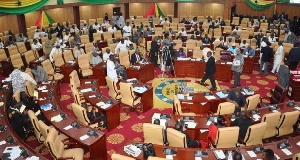Article 11 “Youth Participation” of the Africa Youth Charter states: “Every young person shall have the right to participate in all spheres of society” This becomes the basis for which this article seeks to argue for youth mainstreaming in national development and consequently the need for a National Youth Parliament.
In a Parliamentary Briefing “Mainstreaming Youth: The Key To Effective Youth Development In Ghana” youth mainstreaming implies that youth concerns, visions and contributions are fully taken into account by all government ministries, departments and agencies as well as other institutions and organisations.
Further, the briefing states that, it is a deliberate initiative to involve young people in the formulation, implementation, monitoring and evaluation of national policies.
Youth mainstreaming has its unique advantages: first, it makes policies, programmes and projects responsive to the needs of young people since their views are carefully considered in the design, implementation as well as monitoring and evaluation; it facilitates the building of leadership capacities in addressing challenges; and, it gives them an understanding of the challenges that confront them, thus their demands are reasonable.
One way of mainstreaming youth is the establishment and institutionalising a National Youth Parliament that will be apolitical. This can be done in a situation where young people from the junior high school right up to the tertiary levels are selected and trained to represent their communities and discuss issues that confront them.
The National Centre for Civic Education and the National Youth Authority should be the two authorities that should oversee the selection and training of these young people to form a national youth parliament. This selection can be based on their eloquence in the local or the official language and their willingness to participate in the design, implementation, monitoring and evaluation of national decisions in light of the needs of the youth in their communities and the nation as a whole.
A national youth parliament will afford young people the opportunity to be conversant with the laws of the land, demand accountability from duty bearers, live responsibly, and become change agents of their communities.
In fact, like Okwonkwo the main character in “Things Fall Apart” was worried about who would take over from him when he is gone, as he asked proverbially: “when will the young suckers grow when the old banana tree dies” so should current leaders and policy makers of this nation be worried.
Article 11 of the Africa Youth Charter which Ghana is a signatory to, supports a national youth parliament and total youth mainstreaming to the hilt. It states: “States Parties shall take the following measures to promote active youth participation in society. They shall: a) guarantee the participation of youth in parliament and other decision-making bodies in accordance with the prescribed laws; b) facilitate the creation or strengthening of platforms for youth participation in decision-making at local, national, regional, and continental levels of governance”
Since all young people across the length and breadth of this country can’t all go to the Parliament House in Accra, there’s the need to strengthen and resource the district and regional offices of the NCCE and the NYA to establish district and regional youth parliaments where out of this, young people will elect representatives to realise the participation of a national youth parliament.
This national youth parliament becomes a platform for youth participation in decision making at local, regional, national and continental levels of governance.
Again, another way of mainstreaming youth is having a youth representative at every level of the Ministries, Departments and Agencies (MDAs) and Metropolitan, Municipal and District Assemblies (MMDAs) to ensure that decisions that are taken have the needs of youth part of those decisions.
It’s worthy to note that the youthful population of Ghana is a full human resource base has the potential to put this nation in a positive limelight on the world stage. It’s an opportunity for policy makers to identify this potential to help in the development of the nation.
In an feature: “Ghana’s youthful population: a burden or resource” (Ghanaian Times October 18 2016 edition) John Kisseih Tetteh states on the basis of an increasing youthful population according to the Ghana Statistics Service (2013) the benefit of harnessing the human resource base of young people and its neglect on the nation thus: “this has great potential for socio-economic growth when it is harnessed effectively”. Conversely, “if neglected it becomes a time bomb, risk or burden” he added.
We wouldn’t settle for the latter, would we? A National Youth Parliament would be one sure way of building the capacity of young people for today and tomorrow’s challenges because the young shall grow.
Opinions of Wednesday, 26 April 2017
Columnist: Alex Blege















